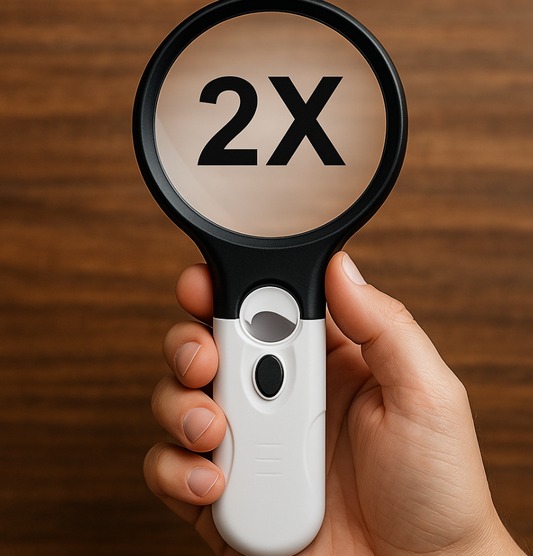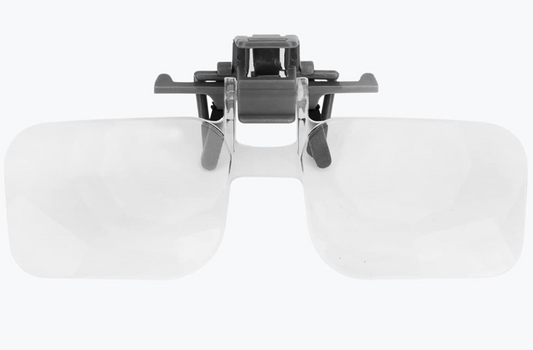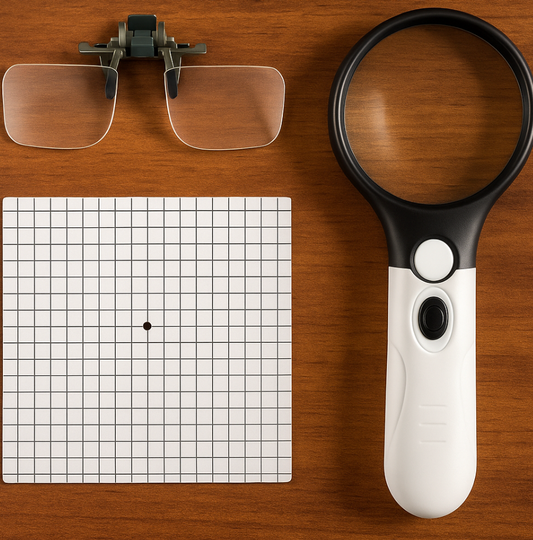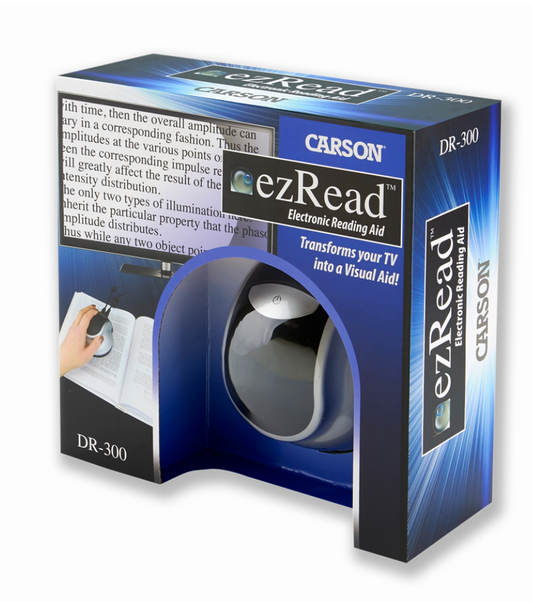Fuch's Dystrophy
Share
Understanding Fuch's Endothelial Dystrophy: Your Guide to Better Vision Care and Treatment Options
Navigating the challenges of Fuch's Endothelial Dystrophy can be daunting, but understanding the condition and exploring effective treatment options can make a world of difference in managing your eye health.
This common corneal dystrophy affects many individuals, leading to vision impairment that can disrupt daily life, but with the right strategies and support, clearer vision is within reach.
In this guide, we'll discuss essential tips for maintaining eye hydration, the role of omega 3 supplements like PRN Omega 3 in preventing dry eye, and how magnification tools can offer help in situations where there is small print or not enough light.
Whether you're personally affected or supporting a loved one, discovering the best resources and treatment options can empower you to take proactive steps towards better vision care.
Understanding Fuch's Endothelial Dystrophy
Fuch's Endothelial Dystrophy is a complex eye condition that affects the cornea. Let's explore its definition, impact on vision, and common symptoms to help you better understand this condition.
What is Fuch's Dystrophy?
Fuch's Endothelial Dystrophy is a progressive eye disease that affects the cornea's innermost layer, called the endothelium. This layer is responsible for maintaining proper fluid balance in the cornea, keeping it clear for optimal vision.
In Fuch's dystrophy, the endothelial cells gradually deteriorate and die off. As a result, the cornea swells and thickens, leading to vision problems. It's comparable to trying to see with a glass of water in front of your vision.
The condition typically affects both eyes and is more common in women. It's often hereditary, but can also develop without a family history.
How It Affects Vision
Fuch's dystrophy impacts vision in several ways as the disease progresses. Initially, vision changes may be subtle, but they become more noticeable over time.
In early stages, people might experience glare and light sensitivity, especially when driving at night. As the condition advances, vision becomes increasingly blurry and distorted. Many patients find the blur is worse upon waking.
Some individuals report seeing halos around lights or having difficulty distinguishing colors. In severe cases, vision loss can be significant, affecting daily activities like reading or recognizing faces.
Common Symptoms and Diagnosis
Symptoms of Fuch's dystrophy often start appearing in a person's 50s or 60s. Early signs include:
- Glare and light sensitivity
- Blurred vision, especially in the morning
- Fluctuating vision throughout the day
- Feeling of having something in the eye
Diagnosis typically involves a comprehensive eye exam. An optometrist or ophthalmologist may use specialized tools like a slit lamp to examine the cornea's layers in detail. Additional tests might include corneal thickness measurement and cell count analysis.
Vision Care and Eye Health Basics
Maintaining good eye health is crucial, especially for those with Fuch's dystrophy. Regular check-ups and daily care routines can help manage symptoms and slow disease progression.
Importance of Regular Eye Exams
Regular eye exams are vital for everyone, but they're especially crucial for those with Fuch's dystrophy or at risk of developing it. These check-ups allow for early detection and timely intervention.
During these exams, your eye doctor can track changes in your cornea's health and adjust your treatment plan accordingly. They may use advanced imaging techniques to monitor the progression of the disease.
For those with a family history of Fuch's dystrophy, starting regular eye exams earlier in life can be beneficial. Your doctor can advise on the appropriate frequency of check-ups based on your individual case.
Daily Eye Care Tips
Implementing a daily eye care routine can help manage Fuch's dystrophy symptoms and promote overall eye health. Here are some practical tips:
- Use artificial tears regularly to keep eyes lubricated.
- Protect your eyes from UV rays with sunglasses when outdoors.
- Maintain good hygiene by washing your hands before touching your eyes.
Consider using a moist heat eye compress to alleviate discomfort and promote better eye health. This can be especially soothing in the morning when symptoms are often worse.
Lastly, stay hydrated and maintain a balanced diet rich in vitamins A, C, and E, which are beneficial for eye health.
Treatment Options for Fuch's
While there's no cure for Fuch's dystrophy, various treatment options can help manage symptoms and improve vision. Let's explore both medical and surgical approaches.
Medical Treatments and Interventions
Medical treatments for Fuch's dystrophy focus on managing symptoms and slowing disease progression. These non-invasive approaches are often the first line of defense.
One common treatment is the use of hypertonic saline eye drops, like Muro-128. These drops help draw excess fluid out of the cornea, reducing swelling and improving clarity. They come in a liquid or gel form. Thealoz Duo eye drops are another clinically proven formula that can provide relief for dry eyes and improve hydration.
In some cases, doctors may prescribe soft contact lenses to reduce corneal swelling. These act as a protective barrier and can help alleviate discomfort.
Surgical Options and Considerations
When medical treatments are no longer effective, surgical intervention may be necessary. The primary surgical options for Fuch's dystrophy include:
- Corneal transplant: This involves replacing the damaged cornea with healthy donor tissue.
- Descemet's Stripping Endothelial Keratoplasty (DSEK): A partial-thickness corneal transplant that replaces only the innermost layers.
- Descemet's Membrane Endothelial Keratoplasty (DMEK): Similar to DSEK but even more selective, replacing only the endothelial layer.
These procedures have high success rates, but like all surgeries, they come with risks. Your ophthalmologist can help you weigh the benefits and risks based on your specific situation.
Tools and Supplements for Eye Health
In addition to medical treatments, various tools and supplements can help manage Fuch's dystrophy symptoms and improve overall eye health.
Magnification Tools for Low Vision
For those experiencing vision loss due to Fuch's dystrophy, magnification tools can be incredibly helpful in daily life. These aids can make reading, writing, and other detailed tasks easier.
Handheld magnifiers with LED lights are particularly useful. They provide both magnification and additional lighting, which can be beneficial in low-light conditions.
Other options include stand magnifiers, electronic magnifiers, and even smartphone apps designed for magnification. The choice depends on individual needs and preferences.
Omega 3 Supplements for Eye Hydration
Omega-3 fatty acids play a crucial role in eye health, particularly in maintaining proper hydration and reducing inflammation. For individuals with Fuch's dystrophy, these supplements can be especially beneficial.
Studies have shown that omega-3s can help improve tear production and quality, reducing dry eye symptoms often associated with Fuch's dystrophy. They may also help protect against oxidative stress in the eyes.
While dietary sources like fish and flaxseeds are beneficial, targeted supplements can ensure you're getting an adequate amount. Always consult with your eye care professional before starting any new supplement regimen.
Lifestyle Adjustments and Support
Living with Fuch's dystrophy often requires some lifestyle changes. Implementing eye-friendly habits and seeking support can significantly improve quality of life.
Incorporating Eye-Friendly Habits
Adopting eye-friendly habits can help manage Fuch's dystrophy symptoms and protect overall eye health. Here are some key practices to consider:
- Take regular breaks when doing close-up work (follow the 20-20-20 rule: every 20 minutes, look at something 20 feet away for 20 seconds).
- Adjust lighting to reduce glare and eye strain.
- Use a humidifier to add moisture to the air, which can help with dry eye symptoms.
It's also important to manage overall health. Conditions like diabetes and high blood pressure can impact eye health, so keeping these under control is crucial.
Lastly, avoid smoking and limit alcohol consumption, as both can negatively affect eye health.
Support Networks and Resources
Living with a chronic eye condition can be challenging, but you don't have to face it alone. Connecting with others who understand your experience can provide valuable emotional support and practical advice.
Look for local support groups or online communities dedicated to Fuch's dystrophy or general eye health. These can be great sources of information and encouragement.
Professional counseling can also be beneficial, especially if you're struggling with the emotional impact of vision changes. Many eye care centers have resources to help patients cope with the psychological aspects of eye diseases.
Remember, your eye care team is also a crucial part of your support network. Don't hesitate to ask questions and express concerns during your appointments.



